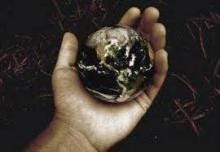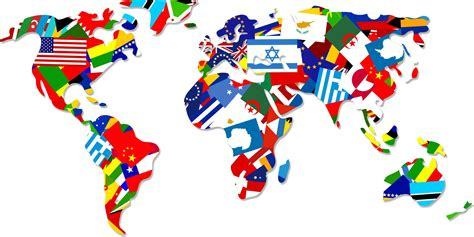Is the "World" also the "Era?"
This article ends with a short poll on what you would like to the next topic.
Jesus uses four different Greek terms that are translated as "world" in one version or another of the Gospels. Two of these words are very commonly translated as “world”. These two Greek words mean very different things. One of these words describes “society”, especially its hierarchies. The other doesn’t refer to a place at all, but to a period of time. When we see the word “the world” in Jesus’s words, he could be talking about either of these things.
This article ends with a short poll about what kind of article you want next.
The World Order, Kosmos
The word most commonly translated as “world” is kosmos (κόσμῳ). In the KJV, it is translated as “world” a hundred and eighty-six times. Jesus uses this word in six-three verses. We recognize the word from our English word “cosmos,” but the Greek kosmos is very different fromr Carl Sagan's cosmos. Kosmos means "order," "good order," "ruler," "world order," "universe," and "the world of men." It means the “world order” It is a form of the is verb kosmeô, which means "to order," "to arrange," "to rule," "to adorn" (especially women), and "to equip." It especially means controlling and arranging an army.
Kosmos means the world of people and its organization. It means human society, our civilization, and the political powers and divisions of that world. The kosmos is the man-made world, the artificial world. It includes not only the physical buildings, our cities, but also our man-made culture: our ideas, our sciences, and so on. Jesus uses this word to describe the archetype of the masculine aspect of civilization, the one that becomes corrupt and oppressive. This is the world he refers to when he tells those who challenge him, in John 8:23:
NIV: You are from below; I am from above. You are of this world; I am not of this world.
Listeners Heard: You yourselves are from the underneath. I myself am from the above. You yourselves are from this familiar world order. I myself do not exist from this familiar world order.
Kosmos should not be confused with another word, ge, (γῆς), that is usually translated as “earth.” Though the concepts are similar in English, they are very different in Greek, and Jesus says very different things when talking about kosmos and than he does when talking about ge. He never says that he came to earth (ge). He always says that he came into the world (kosmos). He speaks in the world (John 16:28). It is the world into which children are born (John 16:21). He and his followers are the light of the world (John 12:46 and Matthew 5:14). It is the world that rejoices (John 16:20) and hates (John 7:7). Every idea he expresses about society, the good and the bad, he attributes to "the world," that is, the kosmos. In some verses, it also seems as though Jesus uses kosmos to refer specifically to the Roman rule of the world. During his era, Rome dominated the known world.
However, Jesus does not usually refer to kosmos as the opposite of heaven. Jesus only contrasts the kosmos with ouranos, the word mistranslated as “heaven” in two verses (John 6:33, John 6:51). The word for “earth” is contrasted with ge, “earth,” with ouranos, “heaven” in sixteen verses.
The Era, Aion
The other Greek word translated as “world” is aiôn (αἰῶν), which means "lifetime," "lifespan," “era,” "a space of time," "an age," an epoch," and "the present world." This is obviously the source of our word “aeon,” but unlike “cosmos” about, the Greek aiôn and “aeon” are very close in meaning. This word is translated as “world” third-eight times in the KJV. However, it is usually translated as “ever” as part of the concept of “forever.” Jesus uses it in forty-one verses and it is translated as “world” thirteen times, almost one-third of the time.
Aiôn is also interesting because it plays a large role in two key ideas that are misrepresented in English translation of the Bible. Three of these involve what we read as “world” in translation. This is the word translated as part of “forever” (see this article) and “eternal” (see this article).
Aiôn is translated as “world” primarily in specific phrases. This happens more often in the KJV and more modern translations. These phrase all seem important philosophically. They include "the end of the world" (four verses, see this article), “the world to come,” (four verses). “care(s) of this world” (three plural “cares” verses plus one singular), and “children of this world (two verses). Notice how many of these phrases end in “of the world” or “of this world.” The “the/this” is the definite article that can be translated either way.
How much does translating these phrases as “world” change their possible meaning? We don’t need to look at whole verses to see this, just these phrases. What would they look like if he was talking about aion as his current era, the time of in which he lived? These phrases would be talking about “the culmination of this era,” the “era to come,” “cares of this era,” and “the children of this era.” Of course, he also may have meant aion as a “lifetime.” These phrases would be talking about “the culmination of this lifetime,” the “lifetime to come,” “cares of this lifetime,” and “the children of this lifetime.” This makes it about our early life contrasted with the lifetime to come.
The Culmination
There is one other word that is always translated as “world.” Fortunately, always just means on in the two verses in which it appears. The word is oikoumene (οἰκουμένῃ), which means "the inhabited region." Literally, it means “home earth,” which has the sense of our English word “homeland.” It was often used to denote the civilized world as separate from the lands of barbarians. However, a close.
The fact that four, very different words, are translated as “world” make it extremely misleading regarding what Jesus is actually saying. Our English word, "world," doesn’t represent any of the concepts that Jesus expressed particularly well. If you read Jesus’s words, how can you tell which of these four words he was saying? The word “aion” is the easiest to identify because it usually appears in one of the four phrases. The other three words, “world order,” “earth,” and “homeland” are harder to identify, but the “world order” is by far the most important.




